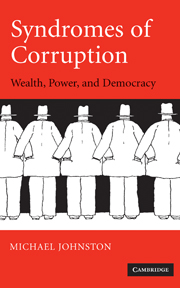Book contents
- Frontmatter
- Contents
- List of figures
- List of tables
- Preface
- 1 Wealth, power, and corruption
- 2 The international setting: power, consensus, and policy
- 3 Participation, institutions, and syndromes of corruption
- 4 Influence Markets: influence for rent, decisions for sale
- 5 Elite Cartels: how to buy friends and govern people
- 6 Oligarchs and Clans: we are family – and you're not
- 7 Official Moguls: reach out and squeeze someone
- 8 From analysis to reform
- Appendix A Countries in each cluster and distances from statistical cluster centers
- Appendix B Statistical indicators for country clusters
- References
- Index
8 - From analysis to reform
Published online by Cambridge University Press: 22 September 2009
- Frontmatter
- Contents
- List of figures
- List of tables
- Preface
- 1 Wealth, power, and corruption
- 2 The international setting: power, consensus, and policy
- 3 Participation, institutions, and syndromes of corruption
- 4 Influence Markets: influence for rent, decisions for sale
- 5 Elite Cartels: how to buy friends and govern people
- 6 Oligarchs and Clans: we are family – and you're not
- 7 Official Moguls: reach out and squeeze someone
- 8 From analysis to reform
- Appendix A Countries in each cluster and distances from statistical cluster centers
- Appendix B Statistical indicators for country clusters
- References
- Index
Summary
Seeing corruption in new ways
It is unlikely that this book will persuade the world that corruption occurs in exactly four syndromes precisely as discussed in the preceding seven chapters. My goal is both more modest and more subversive: I hope the arguments offered here will help change the ways we think about corruption, development, and reform. It is time to rethink the current emphasis on corruption-index scores; the notion implicit in that approach that the problem is essentially the same everywhere; the view of corruption as a primary cause of developing countries' difficulties; and the notion that reform means eliminating corrupt behavior by emulating affluent market democracies. It is not that such ideas are utterly wrong: they have helped put corruption back on the international policy agenda and have strengthened pressures upon leaders around the world to improve the ways they govern. But understanding contrasting syndromes of corruption can open up a new and productive debate over democratic and economic development, reform, and justice. Even if that debate eventually supersedes much of what I have argued here – as will likely be the case – this book will have been a success.
This final chapter has two purposes. First I will briefly revisit some of the main points of the book in part to bring out analytical problems on which further work is needed. Then I will turn to reform.
- Type
- Chapter
- Information
- Syndromes of CorruptionWealth, Power, and Democracy, pp. 186 - 220Publisher: Cambridge University PressPrint publication year: 2005



